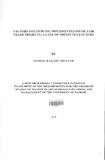| dc.description.abstract | Fair trade is as a partnership between non-profit buyers in developed countries and small-scale in developing countries. Despite the significant scaling-up of Fair trade projects, in order to improve the quality of life of marginalized farmers many Fair trade certified producers have over the years lost the trade agreement that allows them to trade their products as Fair trade certified products. This is because they fail to meet the Fair trade guidelines that govern implementation of projects. Being a Fair trade certified factory, it is therefore essential for Imenti tea factory to exhaustively establish factors influencing implementation of Fair trade projects.
The study targeted the whole region served by Imenti tea factory. The respondents involved were the premium committee members, community leaders and tea farmers. The factors influencing the implementation of Fair trade projects in Imenti tea factory were established. Descriptive survey design was employed with a questionnaire as the main tool of data collection. Data collected was analyzed using Statistical Package for social Sciences (SPSS)
Research findings from this study revealed that there were numerous factors influencing implementation of Fair trade projects which included the level of education, economic factors, inadequate funds, political patronage and planning strategies available. Addressing these factors requires the premium committees to formulate practical and realistic policies that will ensure the fund is managed in the best way possible.
Improving capacity to identify viable projects, capacity building of the premium committee and stakeholders at large on the operations of Fair trade is also essential. Fair distribution of the premiums across the six zones ensures equal development of all parts of the region whilst improved financial control helps check misappropriation of premiums and promotes transparency and accountability. Assessment of the optimal staffing levels should be studied further in order to enhance effective project implementation. Further detailed research is also required to assess the impact of premiums to the community and beneficiaries especially farmers dealing with F air trade products. | en_US |

